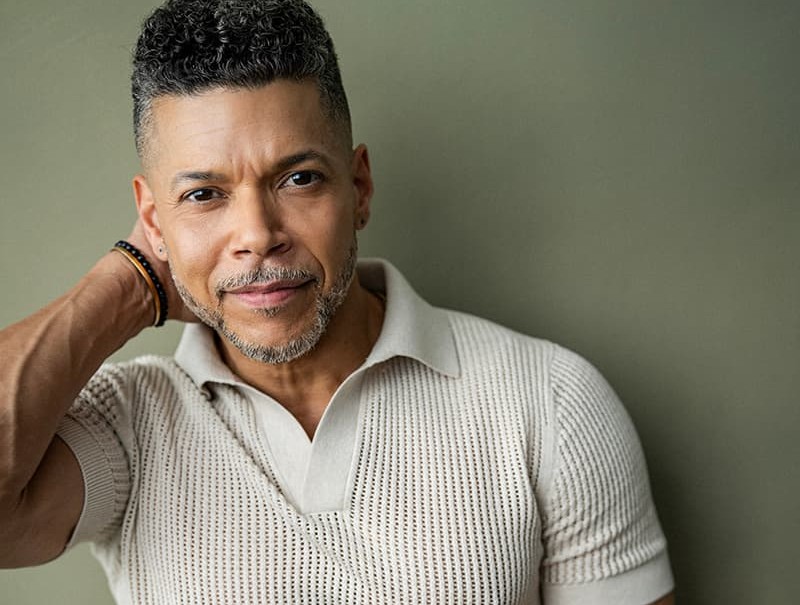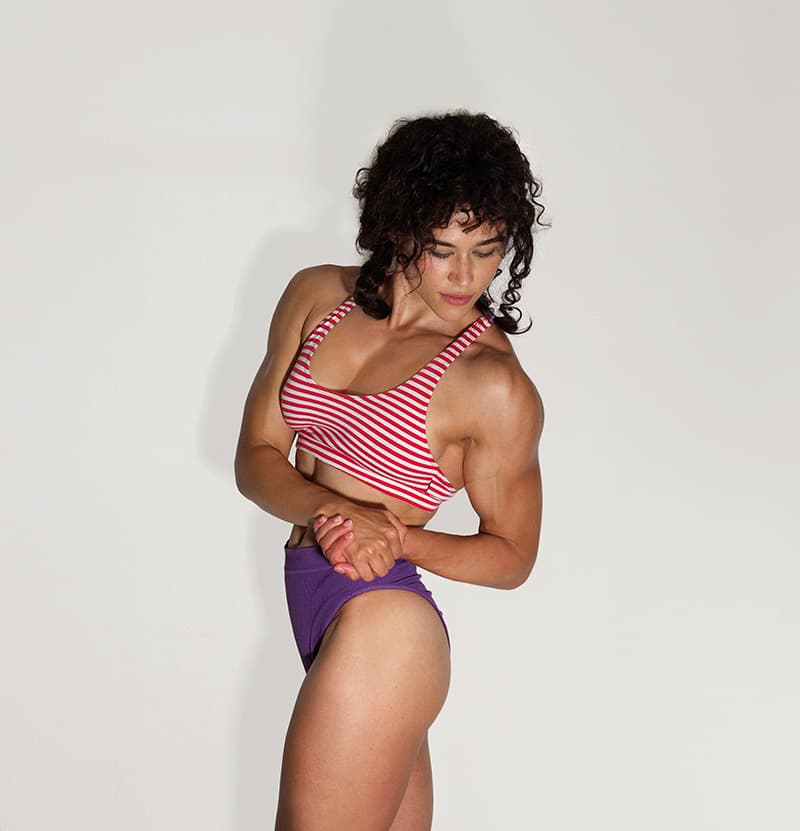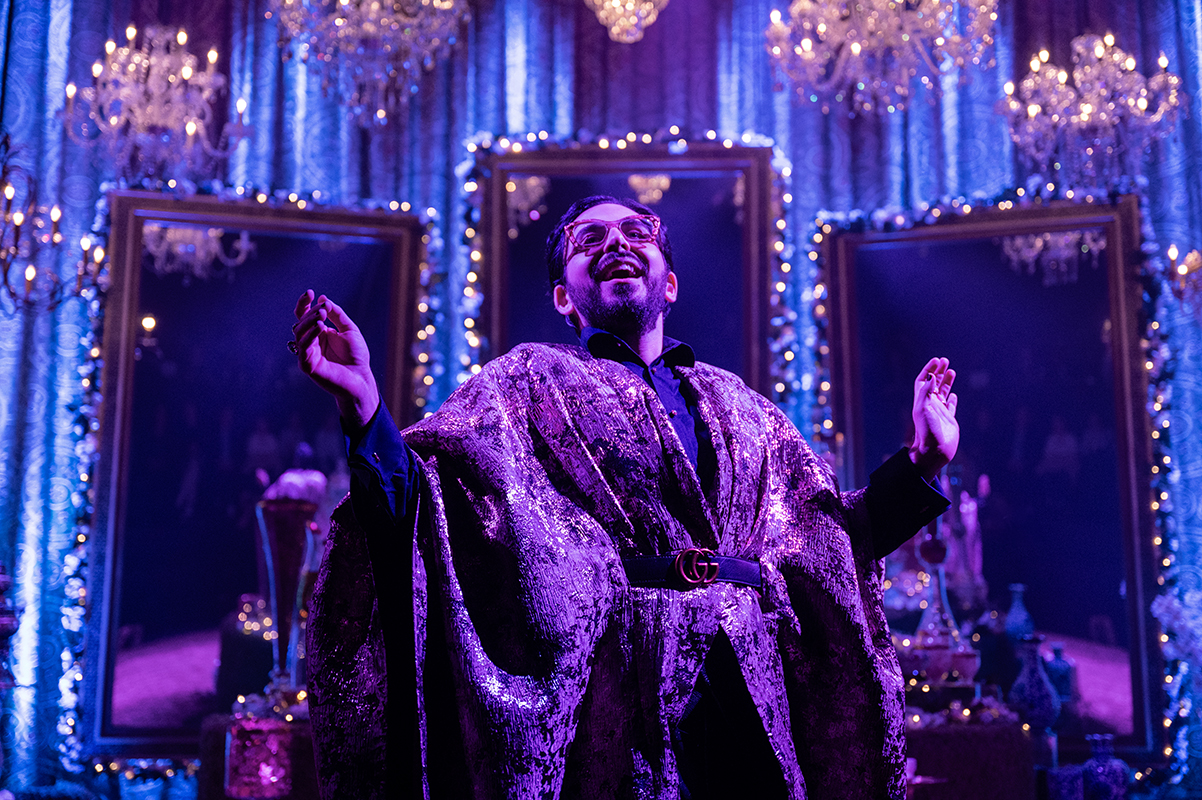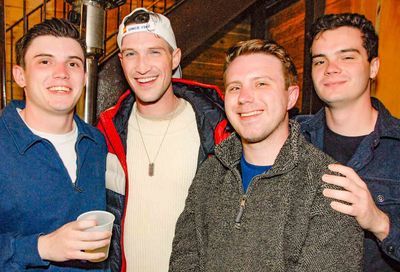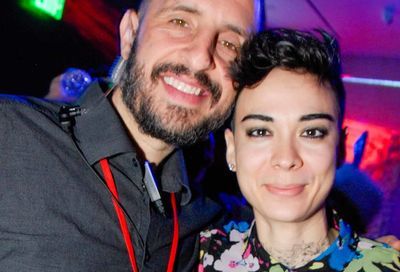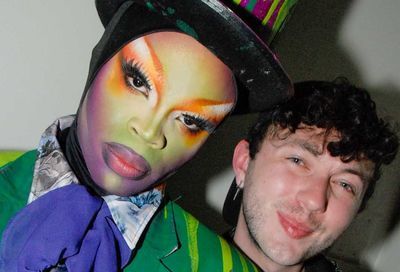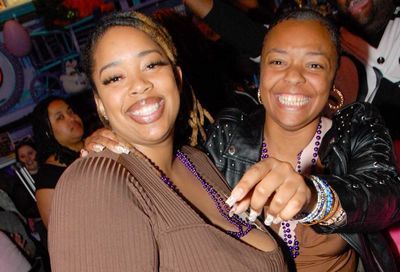Getting Familiar with Harvey Guillén
On the FX vampire hit "What We Do in the Shadows," the gifted queer actor sinks his (wannabe) fangs into the art of deadpan

Harvey Guillén is a master. He’s a master of the deadpan, direct-into-the-camera stare. A master at blending expressions of internalized exasperation with subtle, smoldering anger. A master at the kind of understated comedy that makes his character of Guillermo, on the FX series What We Do in the Shadows, such a joy to behold whenever the camera cuts to him.
But don’t take our word for it. Ask Jemaine Clement, the creator and, with Taika Waititi, executive producer of Shadows.
“The little looks he gives the camera tell so much,” says Clement, currently sheltering in his homeland of New Zealand. “He tells us a lot with the small things that he does. Usually when you play a character, you go bigger than your real self, but in Harvey’s case, he’s smaller and very subtle. He can really choose the right little expressions.”
The series is based on a 2014 film, directed by and starring Clement and Waititi, in which a documentary crew follows a dysfunctional household of vampires on their quest for virgin blood. The film is a riot, its premise a natural fit for expansion into the realm of television. What We Do in the Shadows premiered on FX in 2019, and is currently in the midst of a hilarious second season. It is, fangs down, one of the best comedies currently on television, a fabulously batty mix of goofy supernatural jokes, audacious sexual gags (one involving spectral semen is a genuine howler), and a coffin-full of surprisingly sophisticated, elaborate setups, the crowning achievement of which occurred in season one and involved a council of vampires. It ranks as one of the most inspired, perfectly executed comedy bits in television history. With its legion of vampires, werewolves, ghosts, and even a Babadook, the show feels like a cross between The Office and Buffy, the Vampire Slayer.
As Guillermo, the “Familiar” (read: assistant) to Nandor, whose inflated sense of self-importance is evenly matched by his dimwitted idiocy, Guillén provides the show its humanity, as well as its core dramatic conflict. Guillermo desperately wants to become a vampire, to become something less ordinary than how he sees himself, and therefore toils in servitude to Nandor, to reach the day when his abusive, manipulative master will bestow upon him the honor of eternal life — as a monstrous killer. Until then, the hapless young man — who, it is revealed in season two, is not without formidable powers of his own — suffers the fools with fangs.
“A lot of the show is about destiny,” says Clement. “Maybe Guillermo is destined to be the exact opposite of what he wants? It actually makes it easier to write comedy if there is something dramatic propelling the character. The comedy falls into place later.”

Clement notes that “we auditioned more people for Guillermo than any other. We were trying to find someone who was human and relatable, and who you could [convey] heavy emotions, even though he’s hiding them from everyone who’s around him in the story. When we found Harvey, it was obvious he should be Guillermo.”
For his part, the 30-year-old Guillén is thrilled to be involved with a hit show, one that provides visibility for someone who, as he terms it, “queer, plus-size, and brown.” Just being on the series is affording Guillén the chance to achieve a dream of providing the kind of visibility to others that, when he was a kid growing up in California, eluded him.
Prior to Shadows, Guillén became celebrated in the Latino community for his appearances in the Spanish-language versions of the MetroPCS commercials. Among a slew of one-shot appearances on shows as diverse as NBC’s The Good Place and IFC’s Documentary Now!, he also landed significant roles on SYFY’s The Magicians, MTV’s Eye Candy, and Nickelodeon’s The Thundermans. In 2012, the queer-identifying actor was honored with a GLAAD Media Award for his appearance on the short-lived Fox sitcom Raising Hope. But it’s What We Do in the Shadows that has seen Guillén’s star rise, with critics and fans hailing his deft comic work on the show. Hank Stuever, television critic for the Washington Post, wrote that Guillén “provides at least half the [show’s] big laughs.”
“Every time I make it to a level where I think ‘Wow, this is what I wanted a year ago, two years ago, a decade ago,’ it doesn’t stop me from dreaming to reach the next level,” says Guillén. “It’s recently come to my attention that if Shadows gets nominated for an Emmy, and if I get nominated for my character, I will be the first queer Latino to be nominated in that category in history. So, that alone, is a big “Whoa!” It would be so amazing if we could open that door up for so many other Latinos. If it doesn’t end up being me, but ends up being someone else opening that door, that’s fine. We just have to make the attempt to open it.”

METRO WEEKLY: I really know very little about you. I looked on Wikipedia to research — and there’s virtually nothing in your entry.
HARVEY GUILLEN: [Laughs.] Yeah. And things are never accurate on Wikipedia. Someone sent me a clip saying that someone discovered me at a soda shop. I was like, “What is this, 1955? I was discovered at a soda shop?” I think somebody was having fun by making up their own narrative about me. But I was born in Orange County, California. It was me and mom for the first six years. She was a single parent raising me, working several jobs, an immigrant parent who came to America for a better life.
MW: When did you first want to be an actor?
GUILLEN: I was six years old. I was watching Annie, the musical, and I fell in love with the idea of singing and dancing. I remember looking at my mom and saying, “I want to be that. I want to be what those kids are. I want to be an orphan.” She said, “Oh no, they’re actors, mijo.” I was like, “Well, I want to be an actor.” She goes, “Oh, no, mijo, there’s no money for that.” And I was like, “You need money to play poor on television?” We were already very poor. I didn’t understand how I couldn’t play what those kids were playing. They were in rags, they were orphans, and they lived with a crazy lady who would yell at them. I was like, “I could totally do that, mom! I could totally do that. I can clean, because I help you clean on Saturdays.” She was, “No, mijo, the actors get trained and it takes money to hire a coach.” I said, “Well, I want to do that.” She’s like, “I’m sorry, mijo, it’s not for you.” I remember her saying that it specifically wasn’t for me. It was the first time I realized why aren’t things for me? Who designs and dictates and delegates who is for who? At six, I couldn’t wrap my head around it.
I found out that the nearby YMCA was doing an improv class for $12.50. I went to my mom and she said, “Mijo, no, we have no money for that.” I was, “If I get the money, can I take the class?” She said, “Mijo, if you can find your own way, you can do whatever you want.” That really affected me and I said, “Okay, then I will.” But where am I going to get money? I was six. I didn’t get an allowance. I remember, I walked home from school one day and saw a homeless man going through a trash can. I asked my mom, “What is he doing? It looks so gross?” She said he was looking for cans and bottles to sell. I was like, “You can make money off trash?” So I ran to her closet, got a wire hanger, made a long skinny arm out of it and basically dug through trash to collect cans to raise the money for my first improv class. It took me about four weeks to raise enough money to take the class.
Basically, it turned out to be babysitting for the younger kids. They put the six-to-nine-year-olds together. And all we did was improvise. “Now you’re a bear!” “Now you’re a tiger!” But for me, it was everything. I was living my best life. When it was done, I realized how much effort it took to just get that hour and a half class, and I was like, “Do I really want to go through all that again just to take this one hour and a half class?” I said to myself, “Yeah, I do. I do want to do this again.” And I never looked back.

MW: It’s amazing you knew at such a young age exactly what you wanted to do. Most six-year-olds wouldn’t have the attention span to move forward in the way that you did. It’s very enterprising.
GUILLEN: I had to grow up really quickly. I was always aware of my surroundings. I knew that my mom was working several jobs just to keep the lights on. Which isn’t to say that I had a horrible childhood. We were poor growing up, but I didn’t know that poor was bad. I was happy because I had found my outlet. I knew that I was in charge of my happiness. You can’t rely on someone else to provide that for you — you have to do it yourself.
I think most kids are sheltered, where they are given that way of life. If you can get that, that’s absolutely great. Nothing against that. But a lot of families, especially people of color, it’s not a luxury you get. I’m glad everything worked out the way it did because it motivated me. A lot of people say, “You’re an overnight success!” But they don’t see the work that’s been put in to come this far.
MW: You are very well known in the Latinx community as a spokesperson for MetroPCS.
GUILLEN: I did them in Spanish, yeah. They were national commercials. They had other actors do it in English and then I’d do it in Spanish. We did about 26 commercials. That was a campaign that ran for years. And for years and years anywhere I would go — if there was a Spanish person at a Mexican restaurant, say, or a guy at a taco stand, they’d go “It’s that guy from MetroPCS!” It’s a funny thing about demographics. You can be a pop star from South America, come to the United States and walk around in L.A. and not one person will blink because in this demo that celebrity is not in front of you every day.
But there’s a demographic for everything. If I go to a mall, it’ll be a 14-year old girl who’s like, “Oh my god, I loved you in Eye Candy.” I go to Disneyland and there’ll be little kids that will be like, “Cousin Blobbin!” — calling out the character from The Thundermans, a Nickelodeon show I did. I’ve realized my fan base is, across the board, all over. Different people and backgrounds and languages. It’s fun, because you can tell what really spoke to people when you do the work that you do.
MW: Who’s your fan base for What We Do in the Shadows?
GUILLEN: What We Do in the Shadows is the first time it’s a mixture of everything. I went to a couple of the Cons, and what was really great was finding Latinos who are into goth and dark, cool comedy. Those kids came forward and said, “I never saw anyone that looked like me on television until I saw you on the show. Now I feel seen.” That really resonated with me because I know exactly what those kids feel like. Growing up, there were no kids on TV at the time that looked like me. As I got older, there was no adolescent that looked like me. There was not a lot of representation for someone that I could relate to, being queer, being plus size, being Latino — all these things mixed into one is a rare formula that you didn’t often see on television. Acting didn’t look like a promising avenue for me because I didn’t see myself. But then I realized that just because you don’t see yourself, doesn’t mean you can’t be the first.
MW: Your character, Guillermo, is a Familiar to a vampire. It’s interesting because his goal is to be turned into a vampire — essentially, he has a death wish. Or maybe it’s better put as an eternal life wish.
GUILLEN: It can be the same thing.
MW: Guillermo allows himself to be the floor mat of his master, yearning just to get a little bit of approval. He really resonates with audiences in a relatable way.
GUILLEN: Guillermo is the only human character. He’s had to deal with human emotions and with human storylines. He doesn’t have that whimsical side, as the vampires do, where anything can happen. He’s not a vampire, so he can’t fly, he can’t transform. And he is still dealing with human emotions, which is why I think Guillermo resonates with people because he represents all of us. We’ve all been at a job where we are underappreciated. We’ve all been in a relationship where we’re giving it our all, and our partners probably have one foot out the door. We’ve all been at points where we set goals for ourselves and keep trying and keep trying but we’re not getting anywhere closer. I’ve had so many people come up and say, “I really want the vampires to be nice to him, I really want him to get what he wants, I really want Guillermo to be happy.” We’re all human, we all root for each other. We are all Guillermos at one point or another.
MW: What do you see of yourself in Guillermo?
GUILLEN: I see myself having the determination that Guillermo has. Even though he’s been [with the vampires] ten years, he’s still determined to become one. But he’s starting to look at things differently. I can relate to that. For the longest time in this industry, I was being told, “You’re too fat, you’re too brown, you’re too queer.” You’re being told that you’re all these things. But the second you realize that the things people say are wrong with you are actually your strengths — the second you realize that — you change your mentality, you change your focus. You start thinking, why am I trying to fit a mold to please someone, when I’m my own mold? I’m selling myself. My product is me. My best asset is who I am. And that’s what I’m selling. It’s my organic self.
MW: The vampires — Nandor, Laszlo, and Nadja — are very funny and very loveable, but they’re also essentially idiots, especially Nandor and Laszlo. They’re full of themselves. Guillermo really puts up with a lot. His patience for what his ultimate goal is seems boundless. He’s waiting for that moment Nandor will turn him, but deep inside he must realize that they’re stringing him along.
GUILLEN: It’s like working for someone who doesn’t know the privilege they have. You’re around them, listening to them bitch and complain about their life when it’s like, “Are you kidding me? You’re a vampire, you can fly, you can live forever. What are you complaining about?” The idea of being patient — it’s actually one thing that I wish I had more of. I have patience, but only to a certain extent. Guillermo has way more patience than I do. But I think his patience is wearing thin.
Slowly this season, he’s starting to have enough. Because, essentially, he’s realizing “Wait a minute, I have power in being myself.” I think this was done in the pilot. Taika Waititi directed a brilliant scene where Guillermo opens the curtain at the end and looks over at the coffin and sees a little bit of light touch the coffin. For a brief second, he forgets the documentary crew is there. He looks up at the camera and the camera catches him thinking what he’s thinking, and then we see his reaction of self-realization and horror in his face. Where it’s like, “No, I’m not doing that.”

MW: It’s a wonderful moment. And a very defining one for the character. He’s evolved from the first season in a very unexpected way. He clearly has an affection for the vampires and works hard to protect them from themselves. Yet deep inner-conflicts have arisen in Guillermo in season two. It’s a great twist for the character and deepens the narrative of the series. Can you talk a little bit about it without giving too much away?
GUILLEN: As an actor, I had no idea we were going down that avenue. They don’t tell the actors ahead of time where the story’s going. We also shoot the series out of order. So, we’ll be shooting episode one and that same week we’ll have to shoot a bit of episode five. They don’t tell us what has happened in between, so when we’re shooting five and we ask, “Why is there a car now, and why is it covered in blood?” the writers won’t tell us what we missed in between episodes. Which makes it hard for the actor, I have to say honestly, because you don’t know exactly what your journey was. You don’t know how you got there. You have to beg them for a little snippet of “Can you at least tell me how we got there?” They’re like, “Let’s just say there was an accident.” It keeps you on your toes and it’s really challenging. But the twist that happened in season one I didn’t see coming. I definitely did not even think of that until we were at the first table read, reading it out loud. We were like, “Whoa, this is happening!”
MW: It’s become a driving mechanism of the narrative. And has afforded Guillermo a lot of power, to which the vampires are totally, stupidly oblivious.
GUILLEN: He may not be immortal, but he is very powerful as a human, just with everyday talents.
MW: Guillermo’s goal is to be undead, to become a vampire. But he doesn’t enjoy killing. He doesn’t want to murder people. He hates finding virgin victims for his master to feed on.
GUILLEN: Yeah, he doesn’t love parts of his job where he has to find victims. He is human — and he has feelings and a conscience and regrets. He’s still dealing with those everyday issues that he has to put up with when requested to do the things that are in his work requirements. But he doesn’t want to do them. He’s a softy.
But he does want to be a vampire, which is a contradiction. I feel the angle Guillermo’s coming from is that he didn’t have a great time as an adolescent. He spent a lot of time by himself, probably. He fell in love with this world of vampires because it was so romanticizing. It was sexy, it was badass, it was cool. They get to fly. They wear cool garments. He fell in love with the whole package of living this life because that life is different than the life that Guillermo was dealt. We don’t know what his backstory is — we haven’t seen it yet — but, I, as the actor, made that decision to think his life wasn’t amazing. So the reason he wants to become a vampire is basically because he wants to escape into that world. In a weird way, Taika and Jemaine created a character that’s perfectly aligned with my personal life. I didn’t see representation on screen and wanted to live in that world. You asked me about similarities. I guess Guillermo and I are very similar in that way.
MW: I’m assuming all the filming was completed before the pandemic hit?
GUILLEN: Yeah, the only thing left on season two is ADR — Automated Dialog Replacement. ADR is what we do when, let’s say, a plane flew over the set during a scene and they didn’t get a clear sound of what you said. Normally, you’d go back into a studio and they play back that scene and you try to match the audio. Because of the pandemic, I’ve been doing it in a closet, a soundproof area. I still have episodes 9 and 10 to do for this season.
MW: Do you know yet if there’s going to be season three?
GUILLEN: We do not know yet. Also, because of what’s happening, we don’t know what that would look like. I’m hoping to know soon and how we would go forward with that. Right now, I’m doing more voiceover projects that can be done at home. Things like animation. Those are actually still thriving because we can record anywhere that’s quiet and no one will ever know that that cartoon voice was created in a closet.
MW: I’m sure you can’t tell me anything about the final episodes, but can you reveal if things have been set up to lead into a potential season three?
GUILLEN: We have a great cliffhanger for season two. So the possibility of going forward is there, absolutely. The writers have all done an amazing job. In fact, Episode 10 of season two is one of my favorites, if not my favorite. I also loved the mosquito collector’s episode, which was called “The Curse.” I love that we got to do action in the house with Guillermo. That was a lot of stunt training for me. The producers were like, “Okay, we’re going to get you a personal trainer. You’ve got to go to the gym. You’ve got to work on body strength because it’s about stamina.” Doing those takes over and over, running down the stairs, up the stairs, down the stairs, up the stairs, jumping out of windows. I did every stunt that they threw my way. It was a nice challenge as an actor because I don’t get the opportunity often to be an action character.
MW: What does it mean to you to be an out gay actor working in Hollywood, to not have to hide anything?
GUILLEN: I never wanted to start a career pretending. I knew about Rock Hudson, I knew about all those old Hollywood stars living in the closet because mainstream society wouldn’t accept them. I just felt like I needed to be straightforward with who I am. At the end of the day, if that was going to cost me a job then I probably wouldn’t want to be working with you. If me being myself was going to jeopardize the way you see me because you don’t approve of my lifestyle and who I am, then we probably wouldn’t want to work together. And there’s no amount of money that would be worth the uncomfortableness of being around someone who secretly does not approve of me being who I am.
MW: Have you always been out?
GUILLEN: When I was growing up, people who knew that I was queer knew because I had shared that information. We were comfortable enough to talk about it. Again, it’s my life, no one goes around expressing that they’re straight every day. If you’re in my life, we talk about it, and I tell you who I am. I never shied away from it. And I’m always an advocate and a big supporter, but it shouldn’t be the focus of people’s mentality of how to treat someone. That’s always been my thought. You shouldn’t treat me any differently, because I wouldn’t treat you any differently because you’re straight.
I live on the West Coast where it was an easier transition for me. Growing up in high school, my best friend was a gay Vietnamese kid and my two other best friends were a bisexual girl and a lesbian girl. I grew up with the luxury of being surrounded with queerness and embracing it and being told that it was okay to be that. But you get reminded that’s not the case all over the world. There are states where you get treated differently if they even have a hint you might be queer. I didn’t recognize this until filming a movie in a Southern state. I was out in public — and I don’t consider myself extremely flamboyant — and I just felt this sense of “His skin looks different, he doesn’t belong, he’s not our neighbor, he doesn’t live around here, and I think this guy might be queer.” That was the vibe you just got from walking around. I didn’t like that.
There’s kids out there who have to deal with this every day. I just got a message last night from a fan who is trans and is living in quarantine with their homophobic parents. The idea that there’s a kid out there who has to be quarantined with people who tell him every day that transitioning is wrong. He can’t even escape that environment to run out and try to get some fresh air and get away from the house. He’s literally trapped with his family that’s telling him transitioning is wrong. Well, it’s not wrong. It’s his journey and it’s his right. My heart goes out to him. I wrote him a long essay encouraging him to not give up and to know that he gets to choose his family as well, being part of the queer community, and not to let this one-time circumstance determine the rest of his life, because it will get better.
MW: How does it feel to be a role model in that regard?
GUILLEN: I didn’t set out to be a role model. But creating my own path and my own journey has made people latch on and say, “Hey, if that guy can do it, I can do it,” and that’s great. So, if you think you can do it because you see me as an example, then by all means, yes, I’ll be a role model. We all need something to look forward to. We all need something to aspire to. So, I will gladly accept being a role model.
New episodes of What We Do in the Shadows air on FX every Wednesday at 10 p.m. The full series-to-date is available for streaming on Hulu.
Harvey Guillén broadcasts interviews with select castmembers on Instagram Live at @BeforeTheShadows. Follow Harvey on Instagram and Twitter at @harveyguillen.
Read the full issue below:
Support Metro Weekly’s Journalism
These are challenging times for news organizations. And yet it’s crucial we stay active and provide vital resources and information to both our local readers and the world. So won’t you please take a moment and consider supporting Metro Weekly with a membership? For as little as $5 a month, you can help ensure Metro Weekly magazine and MetroWeekly.com remain free, viable resources as we provide the best, most diverse, culturally-resonant LGBTQ coverage in both the D.C. region and around the world. Memberships come with exclusive perks and discounts, your own personal digital delivery of each week’s magazine (and an archive), access to our Member's Lounge when it launches this fall, and exclusive members-only items like Metro Weekly Membership Mugs and Tote Bags! Check out all our membership levels here and please join us today!





